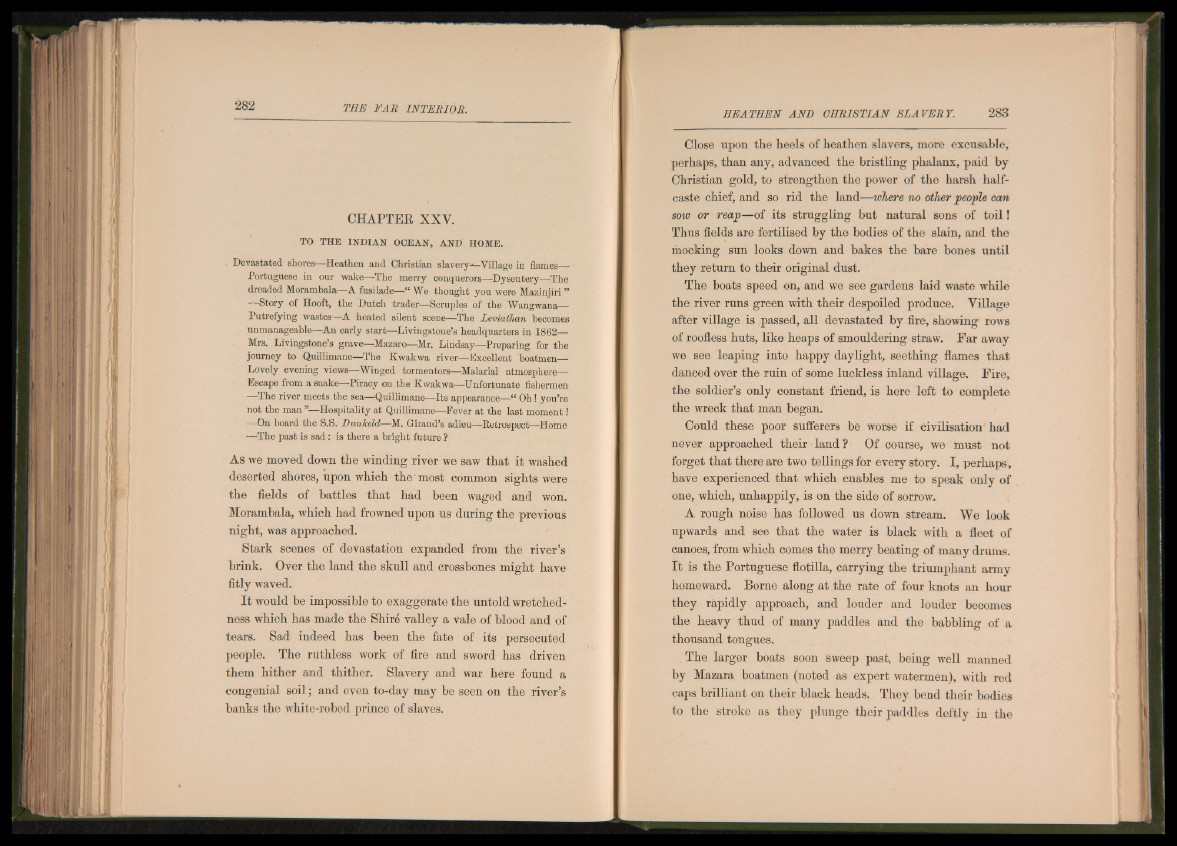
CHAPTER XXV.
TO THE INDIAN OCEAN, AND HOME.
Devastated shores—Heathen and Christian slavery---Village in flames—
Portuguese in our wake—The merry conquerors—Dysentery—The
dreaded Morambala—A fusilade—“ We thought you were Mazinjiri ”
--Story of Hooft, the Dutch trader—Scruples of the Wangwana—
Putrefying wastes—A heated silent scene—The Leviathan becomes
unmanageable—An early start—Livingstone’s headquarters in 1862—
Mrs. Livingstone’s grave—Mazaro—Mr. Lindsay—Preparing for the
journey to Quillimane—The Kwakwa river—Excellent boatmen—
Lovely evening views—Winged tormentors—Malarial atmosphere—
Escape from a snake—Piracy on the Kwakwa—Unfortunate fishermen
—The river meets the sea—Quillimane—Its appearance—“ Oh! you’re
not the man ’»Hospitality at Quillimane—Fever at the last moment I
—On board the S.S. Dwnkeld—M. Giraud’s adieu—Ketrospect—Home
—The past is sad: is there a bright future ?
As we moved down the winding river we saw that it washed
deserted shores, upon which the most common sights were
the fields of battles that had been waged and won.
Morambala, which had frowned upon us during the previous
night, was approached.
Stark scenes of devastation expanded from the river’s
brink. Over the land the skull and crossbones might have
fitly waved.
I t would be impossible to exaggerate the untold wretchedness
which has made the Shire valley a vale of blood and of
tears. Sad indeed has been the fate of its persecuted
people. The ruthless work of fire and sword has driven
them hither and thither. Slavery and war here found a
congenial soil; and even to-day may be seen on the river’s
banks the white-robed prince of slaves.
Close upon the heels of heathen slavers, more excusable,
perhaps, than any, advanced the bristling phalanx, paid by
Christian gold, to strengthen the power of the harsh half-
caste chief, and so rid the land—where no other people can
sow or reap—of its struggling but natural sons of to il!
Thus fields are fertilised by the bodies of the slain, and the
mocking sun looks down and bakes the bare bones until
they return to their original dust.
The boats speed on, and we see gardens laid waste while
the river runs green with their despoiled produce. Village
after village is passed, all devastated by fire, showing rows
of roofless huts, like heaps of smouldering straw. Far away
we see leaping into happy daylight, seething flames that
danced over the ruin of some luckless inland village. Fire,
the soldier’s only constant friend, is here left to complete
the wreck that man began.
Could these poor sufferers be worse if civilisation had
never approached their land ? Of course, we must not
forget that there are two tellings for every story. I, perhaps,
have experienced that which enables me to speak only of
one, which, unhappily, is on the side of sorrow.
A rough noise has followed us down stream. We look
upwards and see that the water is black with a fleet of
canoes, from which comes the merry beating of many drums.
I t is the Portuguese flotilla, carrying the triumphant army
homeward. Borne along at the rate of four knots an hour
they rapidly approach, and louder and louder becomes
the heavy thud of many paddles and the babbling of a
thousand tongues.
The larger boats soon sweep past, being well manned
by Mazara boatmen (noted as expert watermen), with red
caps brilliant on their black heads. They bend their bodies
to the stroke as they plunge their paddles deftly in the